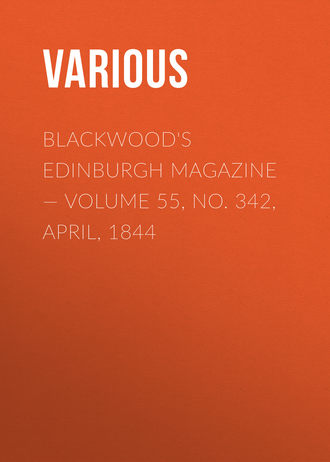
Various
Blackwood's Edinburgh Magazine — Volume 55, No. 342, April, 1844
Such are the desperate attempts to fasten charges of unfairness on this fairest of all recorded trials. And with an interest so keen in promoting the belief of some unfairness, was there ever yet a trial that could have satisfied the losing party? Losers have a proverbial privilege for being out of temper. But in this case more is sought than the mere gratification of wrath. Fresh hopes spring up in every stage of this protracted contest, and they are all equally groundless. First, Mr O'Connell was not to be arrested: it was impossible and absurd to suppose it. Next, being arrested, he was not to be tried. We must all remember the many assurances in Dublin papers—that all was done to save appearances, but that no trial would take place. Then, when it was past denial that the trial had really begun, it was to break down on grounds past numbering. Finally, the jury would never dare to record a verdict of guilty. This, however, being actually done, then was Mr O'Connell to bring writs of error; he was to "take the sense" of the whole Irish bench; and, having taken all that, he was to take the sense of the Lords. And after all these things were accomplished, finally (as we then understood it) he was to take himself off in the direction pointed out by the judges. But we find that he has not yet reconciled himself to that. Intimations come out at intervals that the judges will never dare to pass any but a nominal sentence upon him. We conclude that all these endless conflicts with the legal necessities of his case are the mere gasconades of Irish newspapers, addressing themselves to provincial readers. Were there reason to suppose them authorized by the Repealers, there would be still higher argument for what we are going to say. But under any circumstances, we agree with the opinion expressed dispassionately and seasonably by the Times newspaper—that judgment must be executed in this case. We agree with that journal—that the nation requires it as a homage rendered necessary to the violated majesty of law. Nobody wishes that, at Mr O'Connell's age, any severe punishment should be inflicted. Nobody will misunderstand, in such a case, the mitigation of the sentence. The very absence of all claim to mitigation, makes it impossible to mistake the motive to lenity in his case. But judgment must be done on Cawdor. Two aggravations, and heavy ones, of the offence have occurred even since the trial. One is the tone of defiance still maintained by newspapers under his control. Already, with one voice, they are ready to assure the country, in case of the sentence being incommensurate to the case, that Government wished to be severe, but had not courage for the effort; and that Government dares not enforce the sentence. The other aggravation lies in this—that he, a convicted conspirator, has presumed to take his seat amongst the senators of the land—"Venit in senatum, fit particeps consilii." Yet Catiline, here denounced to the public rage, was not a convicted conspirator; and even his conspiracy rests very much on the word of an enemy. It is true that, in some formal sense, a man's conviction is not complete in our law until sentence has been pronounced. But this makes no real difference as to the scandalous affront which Mr O'Connell has thus put upon the laws of the land. And in that view it is, viz. as an atonement for the many outrages offered to the laws, that the nation waits for the consummation of this public example.


